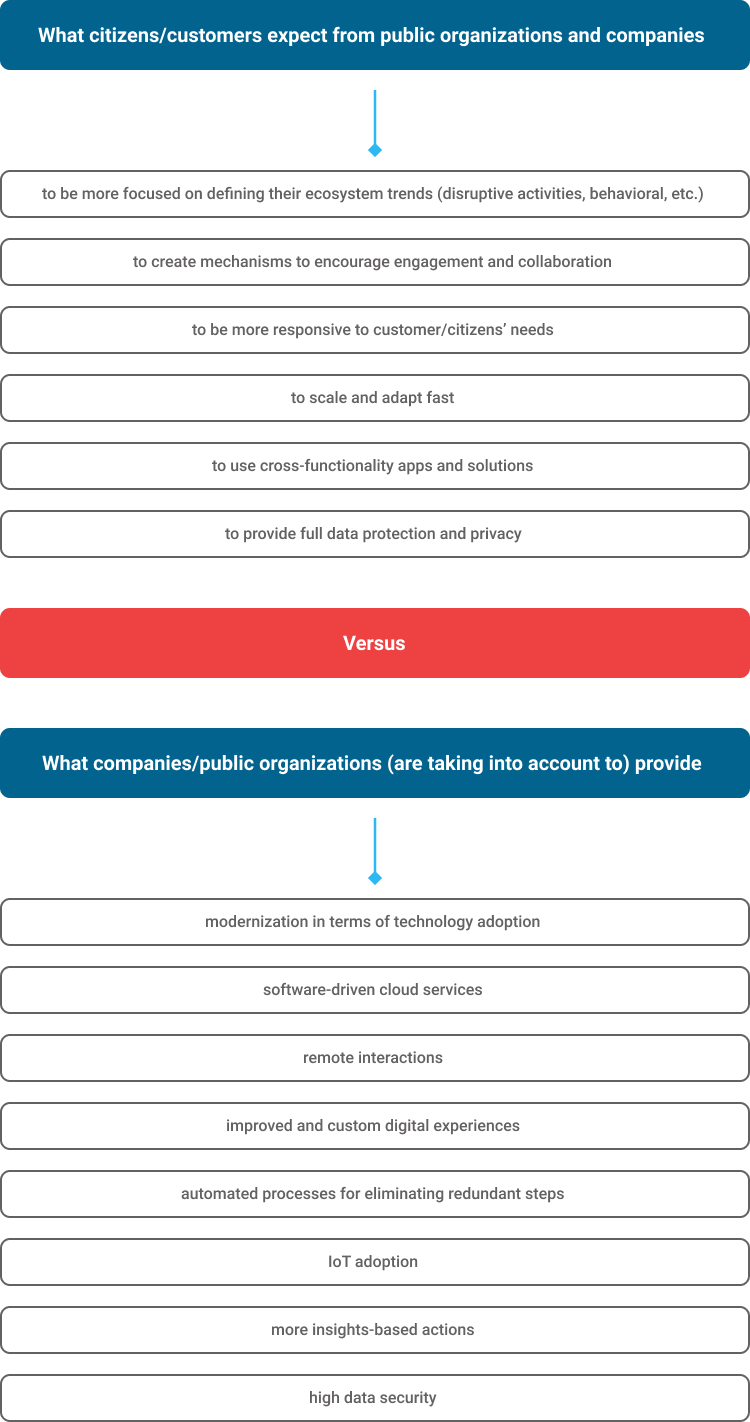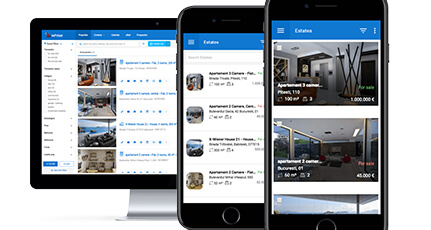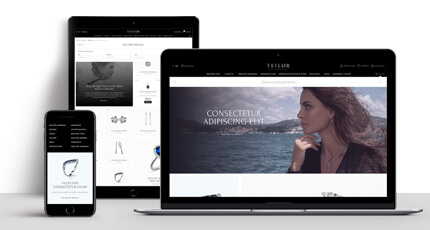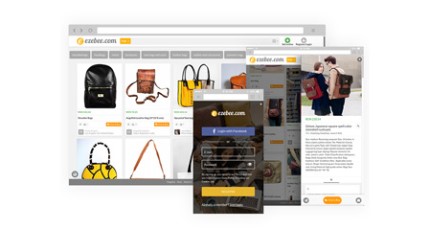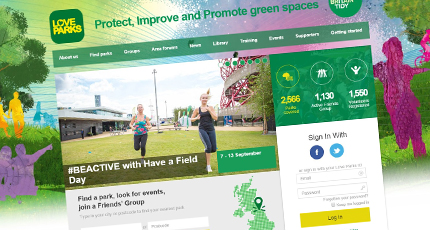
Quick overview on the market and customers’ trends
The gap between what customers/citizens want and what companies/public organizations provide seems less evident in the past two years. Companies and organizations were forced to adapt to the new context by adopting fast digital solutions able to substitute offline services.
Let’s take a look at what customers want versus what companies (are taking into account to) provide.

How we defined our approach for apps and solutions development
For developing new digital products, we are always keeping our focus on what’s happening on the market. In the past years, we all experienced tremendous changes as clients and as products/services providers as well.
As I presented above, both users and companies migrated their attention to digital adoption. And so were we.
The fast switch to remote management, collaborative tools, and custom services impacted almost all industries at several levels. So, we choose to respond to these trends with specific apps, solutions, and features.
Here are some examples of ready-to-use solutions & apps we developed (by industry) in the past years as a response to the changing market:
- City/Community management – SmartCity
- Transportation – TaxiApp
- Fleet management – TaxiFleet
- E-commerce – Delivery App
- Tourism & Hospitality – HoReKa
- Waste management – SmartSanitation
What is SmartSanitation?
As I announced to you from the headline, we’ve just released our latest solution: SmartSanitation – a modular waste management solution based on the “pay-as-you-throw” concept.
This solution was designed for two purposes:
- to complete an existing app, SmartCity (to provide communities and municipalities with extended features & functionalities);
- to serve as a complete freestanding solution for sanitation that addresses clients (household clients and municipal organizations) and waste management companies’ specific needs.
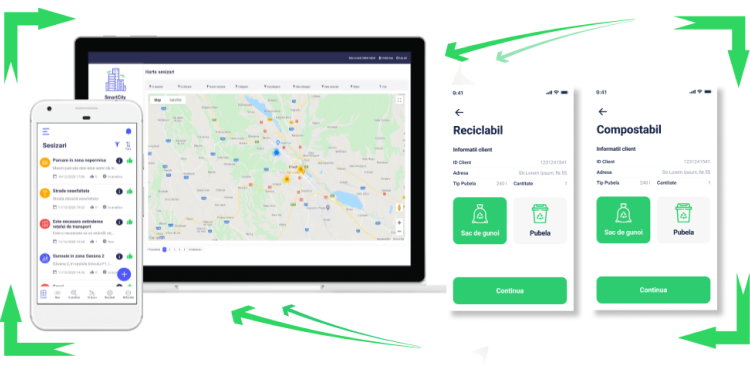
The solution is developed from scratch as a modular platform enriched with features that address waste management specific needs:
- mobility;
- pay-as-you-throw system;
- multi-user apps;
- real-time data synchronization.
For developing SmartSanitation, we’ve analyzed both clients’ and employees’ needs and behavior.
Initially, the waste management company was generating invoices based on a monthly fee agreed through a contract.
But these monthly fees weren’t so accurate, so the risk of incorrect payments being almost inevitable.
We defined the top needs of clients/employees when it comes to waste collection and associated each need with a specific feature (able to provide a performant solution):
Clients’ needs – features (iOS & Android app designed for clients):
- to be charged for the volume of waste generated (the features: by using the QR code the waste management company employees register the waste volume and type (household, recyclable or compostable);
- to have fast access to their accounts and their invoices (the features: the mobile app integrates dedicated tabs on invoices and account status);
- safe interactions with the waste company’s employees (the features: the QR code, the mobile app, etc. allow digital interactions only);
Employees’ needs
The employees’ work was hampered by bureaucracy, standard taxation, lack of flexibility, accuracy in taxation systems and of safety.
That’s why we created 2 interconnected apps that are able to provide all the tools and features needed instantly.
The mobile app is implemented on an Android PDA and allows users (waste collectors) to:
- scan the QR from the bin (the QR code representing the contract number);
- identify the associated client account quickly;
- register the waste volume and type (household, recyclable or compostable);
- generate the charge ticket (are uploaded photos with the bin before the waste is taken over);
- refuse to collect waste (specifying the reason).
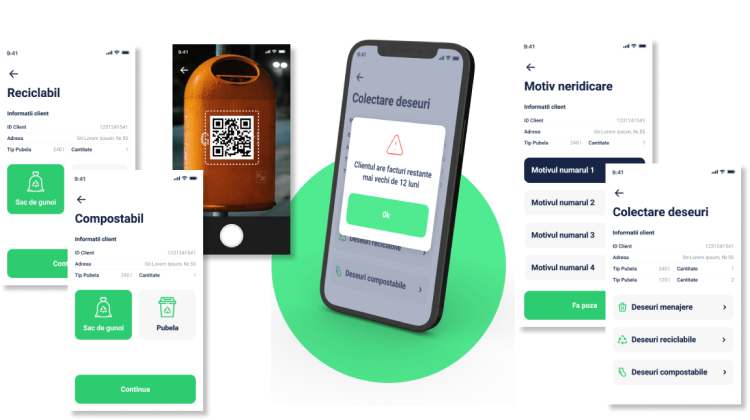
Management web cloud app
The web cloud app is designed with specific features in mind and integrates several modules:
- CRM – In the CRM module are registered all customer data (individuals, legal entities or tenants’ associations), defined contracts per customer, added several dependents related to the same customer, seeing the operations and balance of each customer, issued invoices.
- Operations – This module allows users to track all the operations performed by the sanitation company (waste lifting, volume, and refusals). It can be, also, added to waste collection transactions or refuses’ reasons manually.
- Financial – Based on the contractual conditions, the invoices can be issued automatically or manually, and the clients’ balances and payments can be managed. This module contains the billing logic according to the algorithm requested by the client – the sanitation company (for third parties – town hall).
- Product nomenclatures – This is a specific module developed for listing and filtering products. This module defines the different types of waste that can be collected, u.m. and volume/mass conversion rates, dry waste, wet waste, unit prices for products, taxes, and excise duties.
- Super Admin – This is a dedicated module allowing the entire system to be managed from one dashboard. This module allows the definition of users and access rights in the application, the definition of special rules, and calculation algorithms.
All the new data is sent online to the main management app. If the connection between the app and the server is not possible at some point, the data is saved by the device, and the synchronization is resumed once the internet connection is restored.
Why is the modular approach so useful?
For developing SmartSanitation we chose a modular approach for several reasons that can be put under one general-concept umbrella: flexibility.
By splitting the solution into individual sub-programs, we guaranteed a full flexible and customizable tech environment, able to allow performant further developments and easy and fast implementation.
Advantages for using a modular approach:
- simultaneous developments;
- less time for further developments;
- system defined as user-defined functions;
- potential errors and bugs can be detected easily;
- integrates relevant code only;
- easy to reuse the code;
- easier management;
- easier to test, implement or design;
- collaborative environment.
SmartSanitation’s microservices architecture
Based on MSA (Microservices Architecture), SmartSanitation contains several microservices: Presentation | CRMService | TmService | FinancialService | PdfService | EmailService | Authentication | ApiGateway | ApiOrchestrator | Common projects (ApiKernel, DataAccessKernel, ErpCommons)
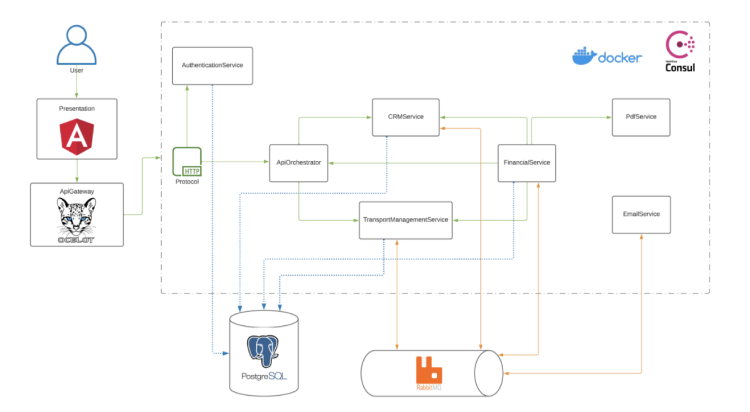
Each microservice is written using SOLID principles to be reactive to events using RabbitMq, store its own data in separate databases, communicate with other microservices over HTTP using Consul to get IP and port using DNS, be resilient to failure using Polly, segregate business logic implementing Command pattern using MediatR, and expose itself at runtime to Consul. Detached from these microservices, the solution uses separate processes in the same context, with the responsibility to automate some flows using BackgroundServices and Hangfire.
The entire solution is containerized using Docker, keeping each service image on Docker Hub and deploying everything to the host machine using docker-compose.
What kind of businesses can use SmartSanitation at its best?
Although it was designed as a dedicated solution for waste management, SmartSanitation can be used extensively in other types of businesses.
Adapted to other concepts:
- as a pay-as-you-consume system;
- as a pay-as-you-save system;
- as a pay-as-you-go system;
- as a pay-as-you-earn system;
- as a pay-as-you-use system;
For other household services: energy, transport, health costs, leisure, etc.
Adapted to several industries: automotive, retail, restaurants, insurance, etc
Why developing your digital solutions with Roweb
Roweb is a custom software development company, started in 2004 with offices in 4 major cities: Bucharest, Pitesti, Craiova, and Ramnicu Valcea.
With our 130+ IT professionals’ experience and the latest software development technologies, we focus on building Enterprise, Web, Mobile applications, and E-commerce solutions.
We work with companies from all over the world, and we understand the needs of and provide solutions for companies of all sizes ranging from start-ups to large enterprises.

“We are dedicated to staying ahead of the rapid changes by working with the latest technologies so that our clients would benefit from our technology expansion. Our mission is to continually keep up with the innovations in the technological world so that the developed software does well in the market.”

Viorel Costea
Co-Founder & CEO Roweb
We have an in-house team of software professionals who manage end-to-end product development projects, from business analysis, consultancy, and architecture, to post-implementation testing and maintenance.
Interested in adapting SmartSanitation to your business?
Get in touch with us for a free consultation session!

